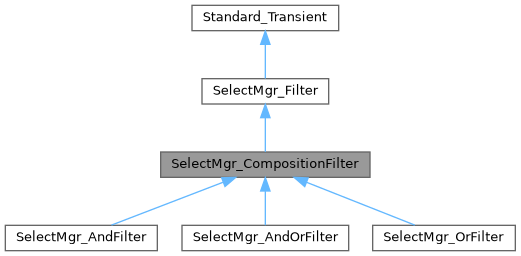A framework to define a compound filter composed of two or more simple filters.
More...
|
| void | Add (const Handle< SelectMgr_Filter > &afilter) |
| | Adds the filter afilter to a filter object created by a filter class inheriting this framework.
|
| |
| void | Remove (const Handle< SelectMgr_Filter > &aFilter) |
| | Removes the filter aFilter from this framework.
|
| |
| Standard_Boolean | IsEmpty () const |
| | Returns true if this framework is empty.
|
| |
| Standard_Boolean | IsIn (const Handle< SelectMgr_Filter > &aFilter) const |
| | Returns true if the filter aFilter is in this framework.
|
| |
| const SelectMgr_ListOfFilter & | StoredFilters () const |
| | Returns the list of stored filters from this framework.
|
| |
| void | Clear () |
| | Clears the filters used in this framework.
|
| |
| virtual Standard_Boolean | ActsOn (const TopAbs_ShapeEnum aStandardMode) const override |
| | Returns true in an AIS local context, if this filter operates on a type of subshape defined in a filter class inheriting this framework. This function completes IsOk in an AIS local context.
|
| |
| virtual Standard_Boolean | IsOk (const Handle< SelectMgr_EntityOwner > &anObj) const =0 |
| | Indicates that the selected Interactive Object passes the filter. The owner, anObj, can be either direct or user. A direct owner is the corresponding construction element, whereas a user is the compound shape of which the entity forms a part. When an object is detected by the mouse - in AIS, this is done through a context selector - its owner is passed to the filter as an argument. If the object returns Standard_True, it is kept; if not, it is rejected. If you are creating a filter class inheriting this framework, and the daughter class is to be used in an AIS local context, you will need to implement the virtual function ActsOn.
|
| |
 Public Member Functions inherited from Standard_Transient Public Member Functions inherited from Standard_Transient |
| | Standard_Transient () |
| | Empty constructor.
|
| |
| | Standard_Transient (const Standard_Transient &) |
| | Copy constructor – does nothing.
|
| |
| Standard_Transient & | operator= (const Standard_Transient &) |
| | Assignment operator, needed to avoid copying reference counter.
|
| |
| virtual | ~Standard_Transient () |
| | Destructor must be virtual.
|
| |
| virtual const opencascade::handle< Standard_Type > & | DynamicType () const |
| | Returns a type descriptor about this object.
|
| |
| Standard_Boolean | IsInstance (const opencascade::handle< Standard_Type > &theType) const |
| | Returns a true value if this is an instance of Type.
|
| |
| Standard_Boolean | IsInstance (const Standard_CString theTypeName) const |
| | Returns a true value if this is an instance of TypeName.
|
| |
| Standard_Boolean | IsKind (const opencascade::handle< Standard_Type > &theType) const |
| | Returns true if this is an instance of Type or an instance of any class that inherits from Type. Note that multiple inheritance is not supported by OCCT RTTI mechanism.
|
| |
| Standard_Boolean | IsKind (const Standard_CString theTypeName) const |
| | Returns true if this is an instance of TypeName or an instance of any class that inherits from TypeName. Note that multiple inheritance is not supported by OCCT RTTI mechanism.
|
| |
| Standard_Transient * | This () const |
| | Returns non-const pointer to this object (like const_cast). For protection against creating handle to objects allocated in stack or call from constructor, it will raise exception Standard_ProgramError if reference counter is zero.
|
| |
| Standard_Integer | GetRefCount () const noexcept |
| | Get the reference counter of this object.
|
| |
| void | IncrementRefCounter () noexcept |
| | Increments the reference counter of this object.
|
| |
| Standard_Integer | DecrementRefCounter () noexcept |
| | Decrements the reference counter of this object; returns the decremented value.
|
| |
| virtual void | Delete () const |
| | Memory deallocator for transient classes.
|
| |
A framework to define a compound filter composed of two or more simple filters.

 Public Member Functions inherited from SelectMgr_Filter
Public Member Functions inherited from SelectMgr_Filter Public Member Functions inherited from Standard_Transient
Public Member Functions inherited from Standard_Transient Public Types inherited from Standard_Transient
Public Types inherited from Standard_Transient Static Public Member Functions inherited from Standard_Transient
Static Public Member Functions inherited from Standard_Transient